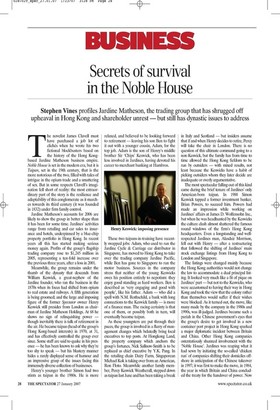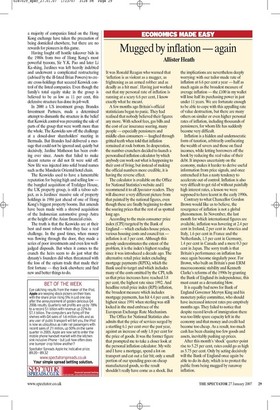Secrets of survival in the Noble House
Stephen Vines profiles Jardine Matheson, the trading group that has shrugged off upheaval in Hong Kong and shareholder unrest — but still has dynastic issues to address The novelist James Clavell must have purchased a job lot of clichés when he wrote his two fictional blockbusters based on the history of the Hong Kongbased Jardine Matheson business empire. Noble House is set in the modern era, but it is Taipan, set in the 19th century, that is the more notorious of the two, filled with tales of intrigue in the opium trade and a smattering of sex. But in some respects Clavell's imagination fell short of reality: the most extraordinary part of the story is the resilience and adaptability of this conglomerate as it marches towards its third century (it was founded in 1832) under firm family control.
Jardine Matheson's accounts for 2006 are likely to show the group in better shape than it has been for some time. Jardines' activities range from retailing and car sales to insurance and hotels, underpinned by a blue-chip property portfolio in Hong Kong. In recent years all this has started making serious money again. Profits of the group's flagship trading company rose to $1,245 million in 2005, representing a ten-fold increase over the previous three years, after a loss in 2001.
Meanwhile, the group remains under the thumb of the dynasty that descends from William Keswick, a great-nephew of the Jardine founder, who ran the business in the 1870s when its focus had shifted from opium to real estate and railways. A fifth generation is being groomed; and the large and imposing figure of the former Spectator owner Henry Keswick still presides from London as chairman of Jardine Matheson Holdings. At 68 he shows no sign of relinquishing power — though inevitably there is talk of retirement in the air. He became taipan (head of the group's Hong Kong-based interests) in 1970, at 31, and has effectively controlled the group ever since. Some staff are said to quake in his presence — he has been known to ask why they're too shy to speak — but his blustery manner hides a rarely displayed sense of humour and an impressive grasp of the issues facing this immensely diverse collection of businesses.
Henry's younger brother Simon had two stints as taipan in the 1980s. He is more relaxed, and believed to be looking forward to retirement — leaving his son Ben to fight it out with a younger cousin, Adam, for the top job. Adam is the son of Henry's middle brother Sir 'Chips' Keswick, who has been less involved in Jardines, having devoted his career to merchant banking at Hambros.
These two taipans-in-training have recently swapped jobs: Adam, who used to run the Jardine Cycle & Carriage car distributor in Singapore, has moved to Hong Kong to take over the trading company Jardine Pacific, while Ben has gone to Singapore to run the motor business. Sources in the company stress that neither of the young Keswicks owes his position entirely to nepotism: they enjoy good standing as hard workers. Ben is described as 'very engaging and good with people', like his father. Adam — who did a spell with N.M. Rothschild, a bank with long connections to the Keswick family — is more of a finance man. The racing certainty is that one of them, or possibly both in turn, will eventually become taipan.
As these youngsters are put through their paces, the group is involved in a flurry of management changes which belatedly bring local executives to top posts. At Hongkong Land, the property company which anchors the group's fortunes, Nick Sallnow-Smith is to be replaced as chief executive by Y.K. Pang. In the retailing chain Dairy Farm, Singaporean Michael Kok is taking over from an American, Ron Floto. Meanwhile another family member, Percy Keswick Weatherall, stepped down as taipan last June and has been taking a break in Italy and Scotland — but insiders assume that if and when Henry decides to retire, Percy will take the chair in London. There is no question of this ultimate command going to a non-Keswick, but the family has from time to time allowed the Hong Kong fiefdom to be run by outsiders — with mixed results, not least because the Keswicks have a habit of picking outsiders whom they later decide are inadequate or overly argumentative.
The most spectacular falling-out of this kind came during the brief tenure of Jardines' only American-born taipan. In 1988 Simon Keswick tapped a former investment banker, Brian Powers, to succeed him. Powers had made an impression while working on Jardines' affairs at James D. Wolfensohn Inc., but when he was headhunted by the Keswicks the culture clash almost shattered the famous round windows of the firm's Hong Kong headquarters. Even a longstanding and wellrespected Jardines man, Alasdair Morrison, fell out with Henry — after a restructuring that followed the shifting of Jardines' main stock exchange listings from Hong Kong to London and Singapore.
The listings were changed mainly because the Hong Kong authorities would not change the law to accommodate a dual principal listing. It looked very much like a fit of pique on Jardines' part — but not to the Keswicks, who were accustomed to having their way in Hong Kong and took the view that the colony rather than themselves would suffer if their wishes were blocked. As it turned out, the move, like many made by the company in the 1980s and 1990s, was ill-judged. Jardines became such a pariah in the Chinese government's eyes that the group's desire to get involved in a new container port project in Hong Kong sparked a major diplomatic incident between Britain and China. Other Hong Kong companies ostentatiously shunned involvement with the 'Noble House'. Jardines was reaping what it had sewn by initiating the so-called 'chicken run' of companies shifting their domiciles offshore in anticipation of the Chinese takeover in 1997; it was first to make the move, in 1984, the year in which Britain and China concluded the treaty for the handover of power. Now a majority of companies listed on the Hong Kong exchange have taken the precaution of being domiciled elsewhere, but there are no rewards for pioneers in this game.
Having fought off hostile takeover bids in the 1980s from two of Hong Kong's most powerful tycoons, Sir Y.K. Pao and later Li Ka-shing, Jardines was left heavily indebted and underwent a complicated restructuring (advised by the ill-fated Brian Powers) to create cross-holdings that secured Keswick control of the listed companies. Even though the family's total equity stake in the group is believed to be as low as 11 per cent, this defensive structure has done its job well.
In 2000 a US investment group, Brandes Investment Partners, made a determined attempt to dismantle the structure in the belief that Keswick control was preventing the sale of parts of the group that were worth more than the whole. The Keswicks saw off the challenge at a closed-door shareholders' meeting in Bermuda. But Brandes had delivered a message that could not be ignored and, quietly but decisively, Jardine Matheson has been evolving ever since. Assets that failed to make decent returns or did not fit were sold off. New life was injected into solid brand names such as the Mandarin Oriental hotel chain.
The Keswicks used to have a lamentable reputation for buying high and selling low — the bungled acquisition of Trafalgar House, the UK property group, is still a taboo subject, as is Jardines' massive sale of property holdings in 1986 just ahead of one of Hong Kong's biggest property booms. But amends have been made with a shrewd acquisition of the Indonesian automotive group Astra at the height of the Asian financial crisis.
The truth is that the Keswicks are at their best and most robust when they face a real challenge. In the good times, when money was flowing through the door, they made a series of poor investments and even less welljudged disposals. But when it comes to the crunch the heirs seem to do just what the dynasty's founders did when threatened with the loss of the opium trade that made their first fortune — they look elsewhere and find new and better things to do.















































 Previous page
Previous page